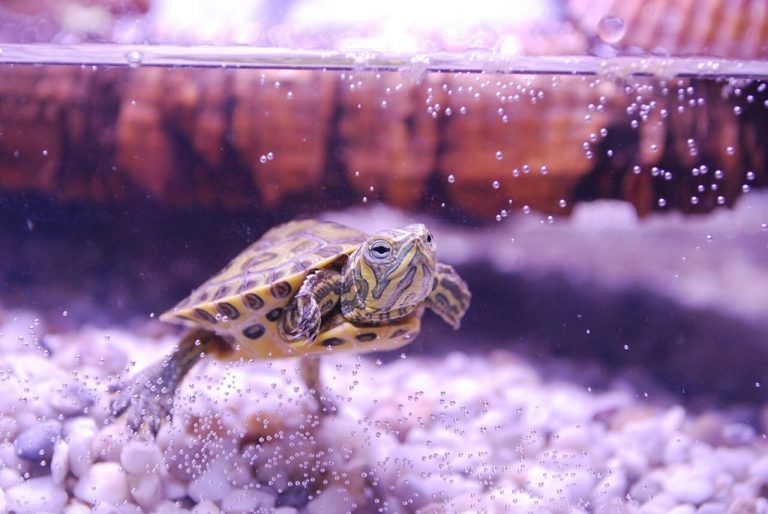How To Tell If Your Turtle Is Dying?
Concerned about your turtle’s health? Wondering how to determine if your turtle is dying? It’s crucial to closely monitor your shelled companion for signs of distress or illness. In this article, we will discuss the key indicators that may suggest your turtle is in trouble. Let’s explore how to identify if your turtle is facing a health crisis.
Turtles may not communicate verbally, but they often exhibit subtle signs when something is wrong. Changes in behavior like decreased appetite, extreme lethargy, or prolonged hiding may indicate an underlying health issue. Be vigilant for abnormal physical symptoms such as swollen eyes, nasal or oral discharge, or unusual skin or shell discoloration. These signs require immediate attention for your turtle.
 Source: reptileknowhow.com
Source: reptileknowhow.comHow to Tell If Your Turtle is Dying:
Is your pet turtle acting strangely? Are you concerned about its health? Turtle owners need to be able to identify signs of illness or decline so they can seek help or give proper care. In this guide, we’ll discuss the main indicators that your turtle may be unwell and give you the information you need to assess its condition. Remember, spotting issues early and taking quick action is vital for your pet’s well-being.
1. Changes in Appetite and Eating Habits:
One of the initial indicators that something may not be right with your beloved turtle is the sudden decline in appetite or a significant alteration in its eating patterns. Should your turtle abruptly cease consuming food or display a lack of interest in its preferred delicacies, it could potentially signify an underlying health concern.
Poor appetite can arise as a consequence of a multitude of internal or external factors, such as infections, imbalances in metabolic functions, dental complications, or even stress-inducing circumstances. An optimal state of well-being for a turtle entails a consistent and robust appetite, thus any notable deviations should be meticulously observed.
Modifications in eating behaviors can also encompass difficulties in swallowing, regurgitation, or an excessive amount of drooling. In the event that you observe any of these aforementioned symptoms, it is judicious to seek the guidance of a veterinarian who specializes in the care of reptilian creatures.
These professionals possess the expertise necessary to conduct a comprehensive evaluation and administer suitable diagnostic tests that will ascertain the root cause of the alteration in eating habits, subsequently offering the requisite treatment.
The Importance of Regular Feeding Observations:
To be a responsible turtle owner, it’s important to monitor your turtle’s feeding habits regularly. This helps you spot changes such as reduced appetite, different food choices, or difficulty eating. By observing and taking notes regularly, you can keep track of your turtle’s food preferences and catch any potential problems early.
2. Unusual Lethargy and Lack of Energy:
If your turtle seems unusually tired and spends most of its time resting or sleeping, it could be a sign of a health problem. While turtles do need rest, a healthy turtle should still be active and curious about its surroundings.
Lethargy can have various causes, such as infections, organ failure, respiratory issues, or metabolic disorders. It’s important to observe your turtle’s behavior over a few days to determine if the lethargy is temporary or a more serious concern.
If you notice sudden changes in energy levels and behavior, consult a reptile veterinarian for evaluation and appropriate treatment recommendations.
Turtle Sleeping Patterns:
Knowing your turtle’s sleep patterns can help you identify any potential problems. Turtles usually rest by basking during the day and sleeping underwater at night. Any changes in these patterns may indicate health issues. If your turtle sleeps more or less than usual, or does not sleep at all, it is important to consult a reptile specialist.
3. Respiratory Distress and Difficulty Breathing:
Respiratory problems in turtles can present themselves in various ways, including open-mouth breathing, wheezing, gasping, or excessive mucus discharge from the nose or mouth. These symptoms are often associated with respiratory infections, such as pneumonia or upper respiratory tract infections.
Additionally, if you notice your turtle extending its neck excessively while breathing or making unusual noises during respiration, these could indicate respiratory distress.
Untreated respiratory issues can have serious consequences, as they may progress rapidly and result in fatal complications. If you observe any of these symptoms, it is essential to seek immediate veterinary care to ensure an accurate diagnosis and appropriate treatment.
Timely intervention and proper medication can significantly improve the chances of your turtle recovering from a respiratory infection.
Creating an Ideal Habitat for Respiratory Health:
Preventing respiratory issues in turtles requires an ideal habitat that replicates their natural environment. Maintaining proper humidity, clean water, and a suitable temperature gradient are crucial for their respiratory health. Regular maintenance and health check-ups can reduce the risk of respiratory problems.
4. Changes in Shell Appearance and Texture:
The shell is one of the primary indicators of a turtle’s overall health, and any changes in its appearance or texture should be taken seriously. A healthy turtle shell should be smooth, symmetrical, and free from any visible abnormalities or damage. If you notice any discoloration, cracks, soft spots, or abnormal growths on the shell, it could be a sign of an underlying issue.
Shell abnormalities can be caused by various factors, such as infections, poor nutrition, metabolic imbalances, or vitamin deficiencies. It’s crucial to regularly monitor your turtle’s shell for any changes and seek professional advice if you notice anything unusual. A reptile veterinarian will be able to diagnose the underlying cause and recommend appropriate treatments to effectively address the shell issues.
Proper Shell Care and Maintenance:
To keep your turtle healthy, provide suitable housing and regular shell care. This involves maintaining a clean and spacious enclosure, offering basking spots and UVB exposure, and providing a balanced diet with calcium and vitamin supplements. Regularly check and clean the shell to prevent infections and catch any problems early.
5. Noticeable Weight Loss or Gain:
Monitoring your turtle’s weight is an essential aspect of maintaining its overall health and well-being. It is crucial to keep track of any significant weight fluctuations, as they can be indicative of underlying health problems that may require immediate attention.
A healthy turtle should have a consistent weight range that is specific to its species, age, and size. By understanding the normal weight range for your turtle, you can better identify any deviations from the norm. Significant weight loss or gain can be attributed to various factors, such as metabolic disorders, organ dysfunction, digestive issues, or nutritional imbalances.
To accurately monitor your turtle’s weight, it is important to use a reliable scale designed specifically for small animals. This will ensure that the weighing process is safe and does not cause any unnecessary stress to your pet. Regularly weighing your turtle will help you detect any changes in its weight and take appropriate action in a timely manner.
If you notice any significant changes in your turtle’s weight, it is advisable to consult a reptile veterinarian. They have the knowledge and expertise to determine the cause of the weight fluctuations and recommend the appropriate course of action. This may involve dietary adjustments, further diagnostic testing, or other interventions to address the underlying health issues and promote your turtle’s well-being.
By closely monitoring your turtle’s weight and seeking professional guidance when necessary, you can play an active role in ensuring its overall health and happiness. Remember, prevention is always better than cure, so don’t hesitate to take proactive measures to keep your turtle in optimal condition.
Identifying Normal Weight Fluctuations:
To differentiate between normal weight fluctuations and significant changes requiring attention, it is important to know the expected weight range of your turtle. Factors like seasonal variations, brumation (a period of reduced activity and metabolism), and natural growth cycles can cause slight weight differences. By regularly monitoring your turtle’s weight and seeking advice from a reptile specialist, you can promptly address any concerns.
6. Abnormal Skin Appearance and Shedding
The condition of your turtle’s skin can provide valuable insights into its overall health. If you notice any discoloration, lesions, ulcers, excessive flaking, or signs of infection on your turtle’s skin, these can be indications of an underlying health issue. Turtles naturally shed their skin regularly, but abnormal or excessive shedding can be a sign of an underlying problem, such as a skin infection, parasitic infestation, or a poor diet.
Pay close attention to your turtle’s skin during shedding periods, looking for any signs of abnormality or distress. If you observe persistent or worsening skin issues, it’s essential to consult a reptile veterinarian for a proper diagnosis and treatment plan. Identifying and addressing skin problems promptly will help prevent further complications and promote healthy skin regeneration.
Providing Optimal Skin Care and Hydration:
Proper skin care and hydration are vital for your turtle’s health. Regular bathing, maintaining proper humidity levels, and preventing dehydration are important for skin care. Also, a balanced diet that meets your turtle’s nutritional needs will support healthy skin and boost the immune system.
7. Changes in Behavior and Interaction:
Turtles may display certain behaviors that can change when they are unwell or approaching the end of their lives. If your turtle becomes unusually aggressive, irritable, antisocial, or exhibits repetitive or abnormal behaviors, it is important to consider these changes as potential warning signs. Turtles may also show changes in their response to stimuli or environmental cues, such as ignoring their favorite hiding spots or showing disinterest in interactions with their owners.
When you observe these behavioral changes, it is crucial to seek advice from a reptile specialist who can assess your turtle’s overall health. They can determine whether the behavior is caused by an underlying health issue or if environmental factors are contributing to the change. By addressing the cause of these behavioral changes early on, you can help preserve your turtle’s quality of life and well-being.
Promoting Mental Stimulation and Environmental Enrichment:
To ensure your turtle’s mental stimulation and well-being, create an enriched environment with hiding spots, basking platforms, toys, and puzzles. Regular interaction, based on your turtle’s comfort level, also enhances its happiness and well-being.
Conclusion:
To be a responsible turtle owner, it’s important to be watchful and attentive to your pet’s health. By detecting signs of illness or decline, you can promptly seek professional help. Consult a reptile veterinarian who specializes in turtle health for accurate diagnosis and treatment. Maintain a suitable habitat, provide a balanced diet, and monitor your turtle’s well-being to ensure a long and fulfilling life for your aquatic companion.
Key Takeaways:
- Monitor your turtle’s eating habits – a sudden loss of appetite may indicate illness.
- Observe changes in behavior – increased lethargy or hiding may signal a health problem.
- Check for respiratory issues – wheezing or gasping for breath can be signs of distress.
- Look for physical abnormalities – swollen eyes, shell damage, or discolored skin may indicate illness.
- Consult a veterinarian – if you notice any concerning symptoms, seek professional advice for proper diagnosis and treatment.
Faqs for How To Tell If Your Turtle Is Dying:
Several signs can suggest that your turtle is in poor health. Look out for a lack of appetite, lethargy, unusual swimming patterns, and unresponsive behavior. Additionally, if you notice bloating, shell deformities, and unusual discharge, it may indicate underlying health issues.
Respiratory problems are a common issue for turtles, especially when their living conditions are not optimal. Symptoms of respiratory distress include wheezing or raspy breathing sounds, discharge from the nose or mouth, open-mouthed breathing, and excessive breathing effort.
If you notice any of these signs, it’s essential to examine your turtle’s habitat. Ensure that the temperature and humidity levels are appropriate and that there are no irritants or respiratory hazards present. If the symptoms persist, consult a reptile veterinarian for a thorough evaluation and guidance.
A loss of appetite in turtles might be an indicator of an ill or stressed turtle. Firstly, ensure that the temperature, lighting, and diet are suitable for your particular turtle species. Offer a variety of foods, including live prey and fresh vegetables, to entice the turtle to eat.
If your turtle continues to refuse food for an extended period, it’s advisable to schedule a visit to a reptile veterinarian. They can conduct a thorough examination and provide you with specific recommendations to address your turtle’s eating habits and overall health.
Dehydration is a serious concern for turtles and can have detrimental effects on their health. Signs of dehydration include sunken eyes, dry and flaky skin or shell, loss of skin elasticity, and decreased urine output.
If you suspect your turtle is dehydrated, take prompt action to increase their access to clean water and ensure they are drinking adequately. In severe cases, it may be necessary to administer fluids under the guidance of a reptile veterinarian.
Yes, stress can have a significant impact on a turtle’s health and well-being. Stressors can include inadequate habitat conditions, improper handling, loud noises, or sudden environmental changes.
Several signs can suggest that your turtle is in poor health. Look out for a lack of appetite, lethargy, unusual swimming patterns, and unresponsive behavior. Additionally, if you notice bloating, shell deformities, and unusual discharge, it may indicate underlying health issues.
If you observe any of these signs, it’s crucial to consult a veterinarian specializing in reptiles as soon as possible. They can provide a proper diagnosis and recommend appropriate treatment or measures to address your turtle’s condition.

Source: ltmcdn.com
Summary
To determine if your turtle is dying, watch for signs such as loss of appetite, lethargy, cloudy eyes, and shell abnormalities. Act promptly upon noticing these symptoms to maximize your turtle’s chances of survival. Maintain a balanced diet, clean water, and appropriate habitat to ensure your turtle’s health. Regular vet visits are essential for your turtle’s well-being.
Ultimately, proper care is essential in preventing illness in your turtle. By being vigilant and seeking professional assistance, you can provide the necessary care for your turtle to enjoy a long and happy life.





